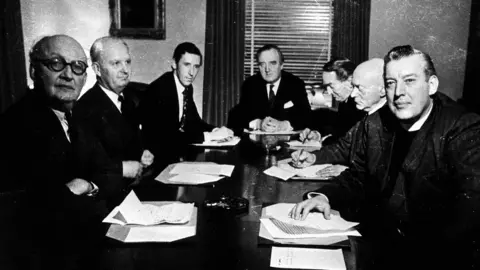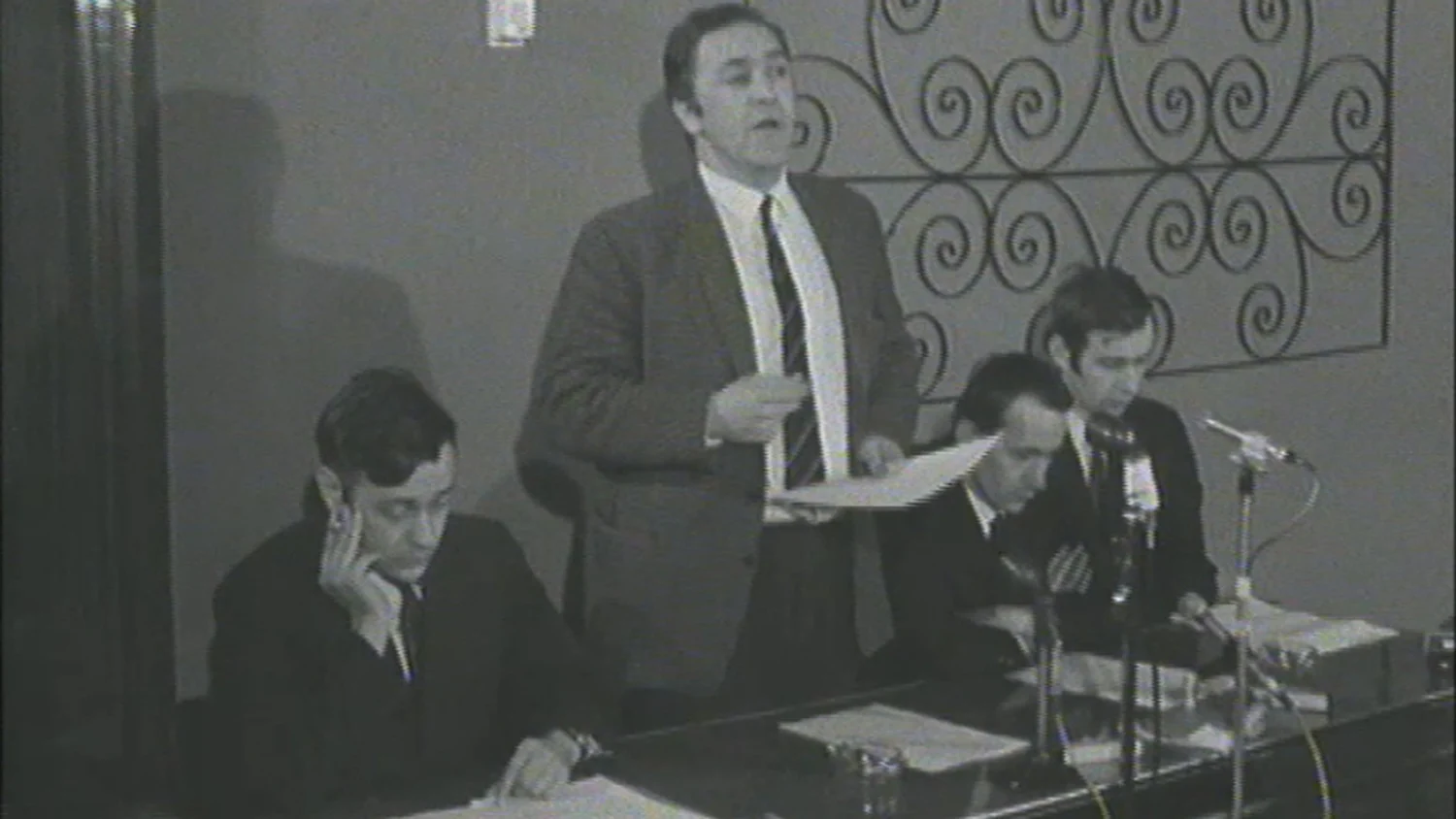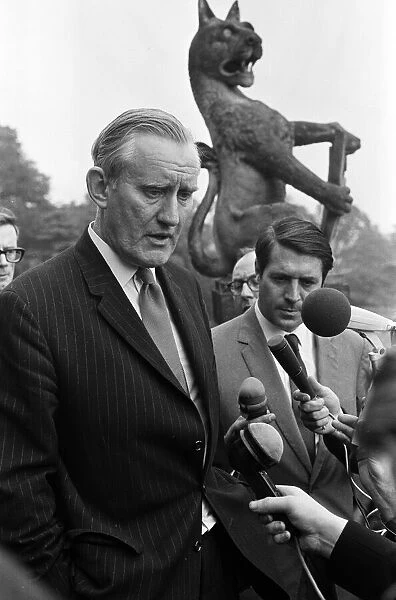Photo AI
Last Updated Sep 27, 2025
Political Developments (Edward Heath, New Political Parties) Simplified Revision Notes for Leaving Cert History
Revision notes with simplified explanations to understand Political Developments (Edward Heath, New Political Parties) quickly and effectively.
324+ students studying
Political Developments (Edward Heath, New Political Parties)
The Troubles were not all specifically about violence. There were also many key political events that led to more unrest, and knowing about these key events is very important when it comes to answering the effectiveness of any PM during the troubles or, indeed, on the violence during the troubles in general. Below are a number of key events that you can read about to gain a greater insight into your study and revision.
The Formation of the Democratic Unionist Party (DUP)
-
The Democratic Unionist Party (DUP) was founded in 1971 by Ian Paisley, a hardline Protestant evangelical preacher, and Desmond Boal, a barrister and former Ulster Unionist MP.
-
The DUP emerged out of dissatisfaction with the more moderate stance of the Ulster Unionist Party (UUP), particularly its leadership under Terence O'Neill and later James Chichester-Clark.

-
The party positioned itself as a staunch defender of Northern Ireland's union with Britain and opposed any concessions to the Catholic nationalist community.
-
The DUP quickly gained support among the Protestant working class and rural communities, particularly those who felt that their interests were being ignored by the UUP's leadership.
-
The party was characterised by its strong opposition to power-sharing with Catholics and its rejection of any negotiations with the Republic of Ireland.
-
Under Paisley's leadership, the DUP adopted a populist and uncompromising approach, which resonated with many unionists who were frustrated by the escalating violence and the perceived weakness of the UUP.
-
The DUP's formation marked a significant shift in Northern Irish politics. It provided a political voice for those who were opposed to the UUP's more moderate policies and who supported a more aggressive stance against the IRA and the nationalist community.
-
The DUP's influence grew rapidly, and it became a major political force in Northern Ireland, often outflanking the UUP on the right and setting the tone for unionist politics during the Troubles.
-
The party's strong stance against any form of compromise with nationalists, combined with its ability to mobilise grassroots support, made the DUP a key player in the ongoing conflict.
-
Over time, the DUP would challenge the UUP for dominance in unionist politics, eventually becoming the largest unionist party in Northern Ireland.
Edward Heath Becoming Prime Minister and Meetings Between the Provos and William Whitelaw
- Edward Heath became the Prime Minister of the United Kingdom in June 1970, representing the Conservative Party.
- Heath's premiership coincided with some of the most turbulent years of the Troubles, as violence escalated and the British government became increasingly involved in the conflict in Northern Ireland.
- One of Heath's key challenges was addressing the growing unrest and finding a political solution to the escalating violence.
- Under Heath's leadership, the British government initially took a hardline stance against the IRA and other paramilitary groups.
- However, the failure to curb the violence through military means led to a recognition that a political solution was necessary.
- This shift in approach became evident in the secret meetings held in July 1972 between the British government, represented by William Whitelaw, the Secretary of State for Northern Ireland, and representatives of the Provisional IRA (Provos).
- These meetings marked the first time that the British government had engaged directly with the IRA, a significant departure from previous policy.
- The talks were held in secret at Cheyne Walk in London and were an attempt to explore the possibility of a ceasefire and a political settlement.
- The Provisional IRA, for their part, sought recognition of their demands, including the withdrawal of British forces from Northern Ireland and the reunification of Ireland.
- Despite hopes that the talks might lead to a breakthrough, they ultimately failed. The British government was unwilling to meet the IRA's demands, particularly the call for British withdrawal, and the IRA was not prepared to end its campaign of violence without significant concessions.
- The collapse of the talks led to a renewed wave of violence, including Bloody Friday in Belfast, where the IRA detonated multiple bombs across the city, causing widespread casualties.
- The meetings between Whitelaw and the Provos were significant because they highlighted the complexities of finding a political solution to the conflict.
- They also demonstrated the British government's recognition that military force alone could not resolve the Troubles, leading to a gradual shift towards exploring political negotiations in the years that followed.
The Emergence of the Alliance Party and the SDLP
-
The early 1970s saw the emergence of two significant political parties in Northern Ireland that sought to offer alternatives to the traditional unionist and nationalist divide: the Alliance Party and the Social Democratic and Labour Party (SDLP).
-
The Alliance Party was founded in 1970, positioning itself as a centrist, non-sectarian party that aimed to attract support from both Protestant and Catholic communities.
- The party's founders were primarily liberal unionists who were disillusioned with the increasingly hardline stance of the Ulster Unionist Party (UUP) and the rise of the Democratic Unionist Party (DUP).
- The Alliance Party advocated for power-sharing, civil rights, and a peaceful resolution to the conflict.

-
It sought to bridge the divide between the two communities and promote a Northern Ireland that was inclusive and tolerant. The Alliance Party's appeal was strongest among the middle classes and those who were weary of sectarian politics, although its support base remained relatively small compared to the larger unionist and nationalist parties.
-
The SDLP was established in 1970 as well, emerging from the civil rights movement that had gained momentum in the late 1960s.
-
The SDLP was a nationalist party, but unlike more militant groups, it firmly rejected violence and instead advocated for a peaceful, democratic approach to achieving Irish unity.
-
The party's leadership, which included figures like John Hume and Gerry Fitt, focused on securing civil rights for the Catholic community and working towards a power-sharing arrangement with unionists.
-
The SDLP quickly became the dominant voice for moderate nationalists, advocating for constitutional change through dialogue and negotiation.
-
Both the Alliance Party and the SDLP played crucial roles in the political developments of the early 1970s.
-
The Alliance Party provided a voice for those who sought a third way beyond the sectarian divide, while the SDLP represented the aspirations of the Catholic community for equality and a peaceful path to a united Ireland.
-
Together, these parties contributed to the shaping of the political landscape in Northern Ireland, promoting dialogue and seeking to reduce the polarisation that had characterised the region's politics for so long.
The Resignation of James Chichester-Clark
- James Chichester-Clark served as the Prime Minister of Northern Ireland from 1969 to 1971, during a particularly volatile period of the Troubles.
- Chichester-Clark, who succeeded Terence O'Neill, inherited a deeply divided society and faced the immense challenge of trying to restore order while addressing the demands of both the nationalist and unionist communities.
- Despite his initial attempts to continue some of O'Neill's reforms, Chichester-Clark quickly found himself overwhelmed by the escalating violence.
- The situation in Northern Ireland deteriorated rapidly, with increased IRA activity and a series of bombings, riots, and clashes between the Catholic nationalist community and the predominantly Protestant security forces.
- While initially seen as a necessary measure to restore order, the British government's decision to deploy the army to Northern Ireland in 1969 only added to the tensions, particularly as the army's role became increasingly controversial.
- Chichester-Clark struggled to balance the demands of the hardline unionists within his own party, who were opposed to any concessions to the nationalist community, and the growing pressure from the British government to find a political solution to the conflict.
- His position became increasingly untenable as he faced criticism from both sides, with unionists accusing him of being too weak and nationalists rejecting his government's policies as insufficient.
- The final blow to Chichester-Clark's leadership came in 1971 when he requested additional troops from the British government to deal with the worsening security situation. Prime Minister Edward Heath's government refused, citing concerns about escalating the conflict further.
- Feeling abandoned by the British government and unable to maintain control, Chichester-Clark resigned in March 1971, expressing his frustration with the lack of support from London.
- Chichester-Clark's resignation marked the end of another attempt to steer Northern Ireland through the growing crisis.
- His departure highlighted the deepening divisions within Northern Irish society and the increasing difficulty of governing a region that was descending into open conflict.
- His successor, Brian Faulkner, would face even greater challenges as the violence continued to escalate, leading to further political turmoil and, eventually, the suspension of the Northern Ireland Parliament.

500K+ Students Use These Powerful Tools to Master Political Developments (Edward Heath, New Political Parties) For their Leaving Cert Exams.
Enhance your understanding with flashcards, quizzes, and exams—designed to help you grasp key concepts, reinforce learning, and master any topic with confidence!
391 flashcards
Flashcards on Political Developments (Edward Heath, New Political Parties)
Revise key concepts with interactive flashcards.
Try History Flashcards41 quizzes
Quizzes on Political Developments (Edward Heath, New Political Parties)
Test your knowledge with fun and engaging quizzes.
Try History Quizzes29 questions
Exam questions on Political Developments (Edward Heath, New Political Parties)
Boost your confidence with real exam questions.
Try History Questions27 exams created
Exam Builder on Political Developments (Edward Heath, New Political Parties)
Create custom exams across topics for better practice!
Try History exam builder117 papers
Past Papers on Political Developments (Edward Heath, New Political Parties)
Practice past papers to reinforce exam experience.
Try History Past PapersOther Revision Notes related to Political Developments (Edward Heath, New Political Parties) you should explore
Discover More Revision Notes Related to Political Developments (Edward Heath, New Political Parties) to Deepen Your Understanding and Improve Your Mastery
96%
114 rated
The Beginning of the Troubles (1969-72)
Focus on: James Chichester-Clarke and His Reforms
238+ studying
181KViews96%
114 rated
The Beginning of the Troubles (1969-72)
The Battle of the Bogside - August 1969
444+ studying
198KViews96%
114 rated
The Beginning of the Troubles (1969-72)
Escalating Violence post-Bogside
408+ studying
199KViews96%
114 rated
The Beginning of the Troubles (1969-72)
Political Developments (Edward Heath, New Political Parties)
499+ studying
185KViews